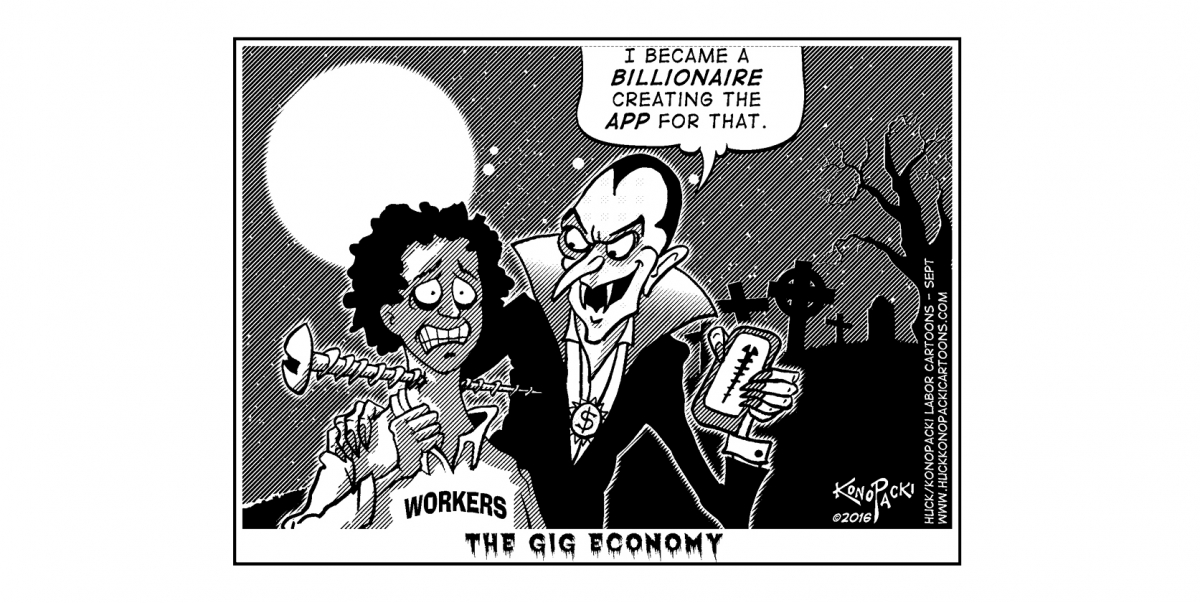Putting the Con in the Gig Economy

It looks like Uber is taking the Machinists union for a ride. Cartoon: Huck/Konopacki Labor Cartoons
It’s called the Independent Drivers Guild—but the new organization for New York City’s estimated 35,000 Uber drivers is “independent” in name only.
Co-founded by Uber and the Machinists union, it's not a union, it has no collective bargaining rights, and it receives financial support from Uber.
Just how much support, we don’t know, since Uber and the Machinists won’t release their agreement—not even to drivers.
If the shroud of secrecy isn’t enough to raise your eyebrows, consider who’s heaping praise on this cozy new partnership. The Mackinac Center—a Koch-backed anti-union mouthpiece that pushed for “right to work” in Michigan—calls it a “model that could bring unionization into the 21st century.”
What will it do? The Guild gives drivers a process to appeal their terminations (which Uber calls “deactivations”). Ten union-selected drivers will attend monthly meetings of a “works council.”
“It’s an opportunity for drivers to sit across the table from Uber management and discuss issues related to pay, dispatch procedures, and paid time off,” said Jim Conigliaro, general counsel and business rep for Machinists District 15. “There are no obligations on either side to come to an agreement. It’s just a discussion.”
Bhairavi Desai has a more critical view. She heads the New York Taxi Workers Alliance, a worker center that represents 19,000 drivers in the city, including several thousand who drive for Uber.
The Guild is an “immoral, illegal, unconscionable company union,” Desai said.
UBERNOMICS
Up until the 1980s, yellow taxis in New York City were dispatched via car radios. Drivers were considered employees, and many unionized.
Then two things happened. First, the radios came out; taxis switched to relying exclusively on street hails. And second, garages moved from a system of commissions—where cab companies took a cut of fares—to leases, where drivers paid to use the cabs and taxi licenses. Cabbies became independent contractors, and their unions were broken.
Without the right to unionize, the Taxi Workers have focused on local regulations, such as pushing to raise fares so drivers can earn a livable wage. They’ve also fought to reduce lease costs.
Now along comes Uber, with all the hallmarks of the employee system—it sets fares, controls dispatches, and takes a commission—yet it claims its drivers are independent contractors.

SUPPORT LABOR NOTES
BECOME A MONTHLY DONOR
Give $10 a month or more and get our "Fight the Boss, Build the Union" T-shirt.
For the company, “it’s the best of both worlds,” Desai said.
This dodge allows Uber to weasel out of Social Security and Medicare taxes and to cheat drivers of legal guarantees to minimum wage, overtime protections, health insurance, workers’ compensation, and the right to organize and bargain collectively.
The truth is, Uber’s astronomical valuation of $68 billion shouldn’t be chalked up to its innovative app so much as to its success at skirting regulations and employment laws. If its drivers were reclassified as employees, Fortune estimated, the combined costs to Uber would top $4 billion a year.
An army of lobbyists and lawyers makes it all possible. Uber employs one-third more of these influence-peddlers than even Walmart does.
As part of the agreement, the Machinists dropped the issue of driver misclassification.
"We don’t comment on whether or not they are properly classified as independent contractors or employees," said Ryan Price, director of the Guild.
PARTNERS IN CRIME
Before all this, the Taxi Workers and the Machinists were planning a joint campaign to organize Uber drivers in New York. “What we didn’t know was that, behind the scenes, they were engaging with Uber to sell everyone out,” Desai said.
Undeterred, the Taxi Workers are challenging Uber in multiple venues, pressing courts and regulators to rule the drivers employees. That would likely make the Guild illegal, as a “company-dominated labor organization.”
The Machinists call their deal with Uber “groundbreaking” and are trying to spread the model to Philadelphia. But it looks like Uber is taking the union for a ride—basking in positive press while maneuvering workers into meetings where they have no leverage or possibility of building power.
The Guild will never transform Uber’s business model. At best, such secret agreements and partnerships with management are doomed strategies.
At worst, a defanged union becomes a partner in exploitation.
This article has been updated to add the quote from Price and to make clear that the union has dropped the misclassification issue.





